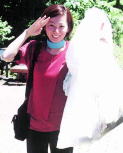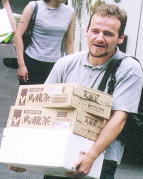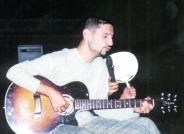NO.169ー4
Report on the 11th Retreat (continued)
| Summary of Lectures Given at the Retreat (Part 1) |
By Mr.Noriaki Sagara Director, Overall Planning & Coordination
Dept.,National Institute for Education Research of Japan (Standing Director, Meguro UNESCO Association)
In every society there exists a culture, and in each culture there always
exists a value. To my understanding, this value implies“what we should
do or what we should not do," and it is the role of education to transmit
this implication to the next generation. Nowadays, the relationship between
parents and children or teachers and pupils has become that of friends
each other, but, in such a relationship it would be difficult to transmit
values. For transmitting a value, an authority is required, therefore,
parents and teachers must not divest themselves of their own authority. A
grand mistake in today's system of school education is that it is scaling
down in rapid succession the volume of the curriculum as a whole under
the pretext of“Education with Margins." Whereby Education with
Margins is not good, it is cramming as a system. The capacity of educatees,
however, varies naturally from one to another and it is the ability of
teachers that makes a clear view of the situation. It would be pointless
to use for school education an abstract expression such as an education
for the mind or a force of living. These are what parents should teach
their children at home, and it is important at school to impart knowledge
before everything else. It would also be a proper attitude of the parents
at home to provide home discipline and to give enlightenment to their
children of the values existing in their home.
Today, I feel a great pleasure to have known that so many young people are
capable of action, each one of them clearly conscious of his given role and
position, whether in the bus, in preparing meals, in charge of disposing garbage
and so on, after I spend the whole day together with you.
30.7.2000 The responsibility for the wording (in Japanese) lies with: P.R. Activity
Committee
◎ On Duty in Disposing of Garbage ◎

Discussions by the youth were unrolled, naturally, also on high-level issues
such as “What can we

do for peace?," “Which is the way to a post of being an international
servant?," etc., etc. But it was equally admirable to get to know
the generous and thoughtful minds of the participants, through their
voluntary activities such as accepting to be on duty in disposing of garbage,
taking part in being a luggage carrier, telling willingly about own home
country to the grandchildren of the superintendent of the Village and
so on. Also Mr. Yuji Suzuki, our guest speaker
who so kindly accepted our request for providing a lecture despite his
tight schedule, commented repeatedly on his way back, “It was nice
to have been able to meet young people who were so wonderful.”
| To Move the Minds of People Taku Inoue, Chief Leader |
|
It is not the“people in person" but“their minds" that we
want to move. To approach by the way of discussions is an attempt to understand
mutually the difference of our cultures, customs and ways of thinking. To
approach by the way of events is another attempt to recognize the points
we have psychologically in common. To make events successful, we should
of course make the preparations neatly and precisely. But it is more important
that we work them up into our own way. By imitating what other groups do
or what can be found in books, it seems to be difficult to communicate
“my mind" that “I" want to make the participants really enjoy
the events. It may be exaggerating if I say I will “make a puppet of
their minds ," but it appears to be effective to make the preparation,
giving priority to their psychological elements. Either at the Retreat
or by the events, emotional response may be felt in case “the minds"
of the participants become intercommunicative.

If so, then what will be the key to the intercommunication ? The key,
surprisingly enough, derives from a combination of simple elements. These
elements are “physical exercises" and “mental gymnastics" in
consideration of the instinct of human beings and “smiles" and “greetings"
in consideration of the things we have in common in whichever country of
the world we may be living. Human beings act with purpose for any kind
of work or play, which means “concept." For the rest of the combination,
we may proceed with our experiences and feelings.
At the Retreat this time, young leaders made planning of the events puzzling
for realization of one event after another. It was hard work for them
to continue groping with their feelings for whether the event will be enjoyable
or not checking with their own minds. In this way they organized
and produced the games to be played in the bus as an orientation (though
dropped for trouble with the bus), the campfire etc. The“elements which
move the minds"can be found in various scenes. They should be found
easily and abundantly in our everyday life, too, and it is my sincere
wish that those who are able to make a strenuous effort at the Retreat
next year as staff and those who have been moved by the Retreat will try
to find out their own feelings for pleasure and make good use of them
in their daily life
photo: Mr. Onurs, leader of the students studying in japan, accompanying
himself with the guitar
.
 do for peace?," “Which is the way to a post of being an international
servant?," etc., etc. But it was equally admirable to get to know
the generous and thoughtful minds of the participants, through their
voluntary activities such as accepting to be on duty in disposing of garbage,
taking part in being a luggage carrier, telling willingly about own home
country to the grandchildren of the superintendent of the Village and
so on. Also Mr. Yuji Suzuki, our guest speaker
do for peace?," “Which is the way to a post of being an international
servant?," etc., etc. But it was equally admirable to get to know
the generous and thoughtful minds of the participants, through their
voluntary activities such as accepting to be on duty in disposing of garbage,
taking part in being a luggage carrier, telling willingly about own home
country to the grandchildren of the superintendent of the Village and
so on. Also Mr. Yuji Suzuki, our guest speaker